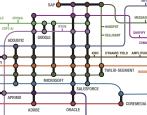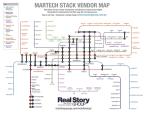Clouds vs Best-of-Breed in Digital Marketing
Do you remember the early years of Enterprise Content Management (ECM) -- when it was promoted as an all-encompassing technology consisting of Web Content Management (WCM), Digital Asset Management (DAM), Knowledge Management, Document Management, Collaboration and many other services? Well, in the digital marketing space, those years are returning under a new guise.
All In One?
In the ECM era, we were all pitched "suites," mostly from large infrastructure vendors, that claimed to do everything you needed for information management. Major analyst firms often recommended you to establish a "strategic relationship" with (a.k.a., standardize on) one suite vendor so you could fulfill all your needs with a single product family.
It Was a Myth
Those "suites" typically cobbled together multiple products to give an impression of one single platform, whereas in reality, there were totally different solutions with different architectures, repositories, user management, administration, and so forth.
Also, the requirements for different use cases (e.g., web vs. document management) very different turned out to be quite different. Expecting one product to do everything could at best give you a compromised experience. Which is why, in the end several ECM vendors (e.g., Oracle, Alfresco, and Documentum) ended up removing WCM capabilities from their main document management platforms.
History Is Repeating Itself with Digital Marketing
We see the same thing -- the same hype -- getting repeated in the Digital Marketing marketplace. Many vendors are pushing Digital Marketing "Clouds" -- the new moniker for suites. And the same cast of industry analyst shills are lining up to promote them on vendors' behalf.
As with ECM Suites, most Digital Marketing "clouds" are actually a collection of independent products, brought together via acquisition from multiple different companies. Vendors of course disagree and will point to how you can manage disparate functionality from a single dashboard. In reality, once you get into the applications themselves you'll find radically different architectures, disparate user and content repositories, different admin modules, separate security implementations, divergent licensing models, and diverse user interfaces.
Our Advice
Digital Marketing is a very rapidly evolving marketplace. Larger enterprises in particular often need fairly specialized services and not generic dashboards. For example, you may well require social media marketing features from one product but for social media monitoring, you might require a completely different offering.
While some Marketing Clouds have acquired companies whose products were well regarded in their respective arena (e.g., Radian6 for Social Media Monitoring), you should evaluate each product individually on its merit and not because it's part of a suite.
In other words: it's too premature to align with a single über-vendor here.
Fortunately, you have many options. You can always download a sample of RSG's hard-hitting vendor evaluations, or ask us for advice.








